Tell us a little about yourself, your family, including how you got started as a journalist?
Huhh… In our family we have five kids (the youngest is of the age of 17, the oldest 31, with various degrees of education, hobbies, and spending habits); two most adorable grandchildren; several dogs of numerous sizes, ages and (non-)pedigrees; varying number of current and rising number of ex-girlfriends and current love affairs; two son-in-laws with vibrant business ideas… My father is 91, my mom is 86 (and I am not even counting them among the kids)… Our ordinary pre-Covid19 family Sunday lunch would count more than a dozen of ear-splitting and mobile-phones-armed people around the table, with a variation of healthy and very-unhealthy food on a quite outsized table, usually starting with a number of glasses of yellow rakia, followed by bottles of good Macedonian wine and local Skopsko beer… At any day of the year we have more logistical complications than an average mid-size state institution around the world, including the budget, real-estate, transport and communal implications on a par with the International Olympic Committee.
A word of advice: DO NOT try to do this social experiment at your home!
I am 56 years old and I started journalism 38 years ago… I’ve seen “everything,” I’ve written thousands of articles (from the youth magazine “Mlad borec”, through a number of local and regional daily newspapers and magazines, to – one article! – in “New York Times”) and equally insane number of on-the-air TV appearances on domestic and foreign TVs; I’ve coordinated teams of three to seven hundred and three people in more than 15-20 organisations that I worked for – and, today, I am most of the time sick and tired of many of the things that are going on in the current media affairs in my country, in the region, and around the world… And then, every once in a while, I am impressed and overtaken with joy by the high notes that journalism can perform in the society lost in its preoccupation with money and ill-defined ways of what is a definition of a success in modern life!
A word of advice: DO NOT choose journalism as your professional occupation, it is an obsolete job that demands a lot, but brings rare satisfactions, mostly depending on factors beyond your control. However, if you are so desperate to choose journalism as your career, be prepared to fall in love with it and share the stress, uncertainty and wonderfulness of any love affair.
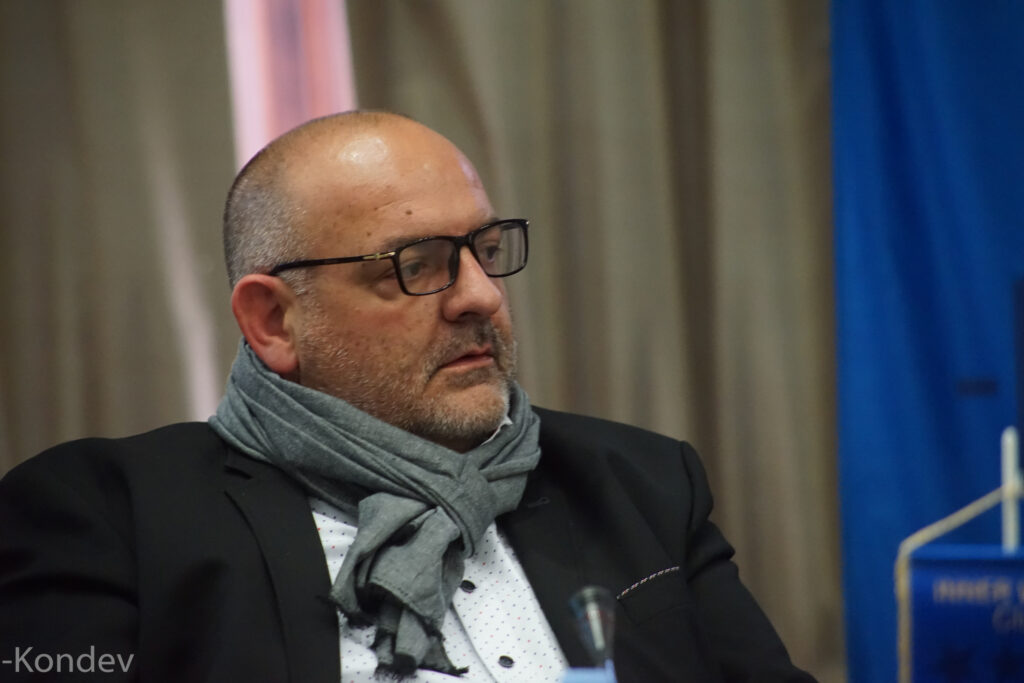
Sasho Ordanoski
What is the difference between journalism when you started and today?
In short, the BIG difference is: Internet. The job of journalists – opposite of what most of the people, and even journalists presume – is not to deliberate about “truths” in the society; but to contextualise facts in a balanced way in order that the audience(s) can decide on the plurality of “truths”, on the basis of best argumentation offered. So: facts and context!
But in today’s world of internet’s “alternative facts”, social networks’ mobs and “fake news”, with incivility and sensations as norms of communication, when the speed of the news is more important than the quality of context, it is very difficult to survive as a qualified media on the market, both professionally and financially.
Modern democratic societies need good journalism more than ever, but they demand scandals and entertainment instead. And they get it with shovels directly in their open mouths.
You worked as manager in MTV – the public broadcaster in North Macedonia and also for the private TV channel Alsat M. What was the difference to be the boss in the public and in the private TV?
It is about how you use the managerial power and about the differences in priorities. Public broadcaster is a mastodon with resources and functions that in many instances are not commercially viable, but necessary; while private TV survives on the market and needs to have commercial interests equal to professional and program demands. However, both in public and private media, regardless of the number of employees and the size of the budgets, professional and human integrity of people is probably the most important thing for success. Managing those resources – people, money, and programs – requires a lot of professional skills, human empathy, and persistent energy. Plus the good understanding of social and political agendas in the country. At least a “drop” of vision is also desirable to keep you survive endless daily challenges. Most of the days.
You founded the weekly Forum. Can you tell us a little more about this period of your life?
“Forum” magazine was a liberal orientated weekly, bi-weekly and, eventually, monthly publication that we started in 1996 and sold it in 2007. It was a high-quality magazine, both in journalistic and in production senses, with narrative journalism and long interviews in the centre of its style, with special care for high quality photography and elegant layout, in the years when printed journalism was still making market and media sense. We had our own printing press and our ambition was to publish a local “cross-breed” between the once famous “Start” magazine (published in Zagreb in the time of ex-Yugoslavia) and “The New Yorker”. For a decade of its publishing “Forum” nurtured a stable and demanding public, progressively politically oriented. We sold it in 2007 to people who wanted to keep its political and cultural influence in support to the then new Macedonian government led by Mr. Nikola Gruevski. Few years later it vanished from the market.
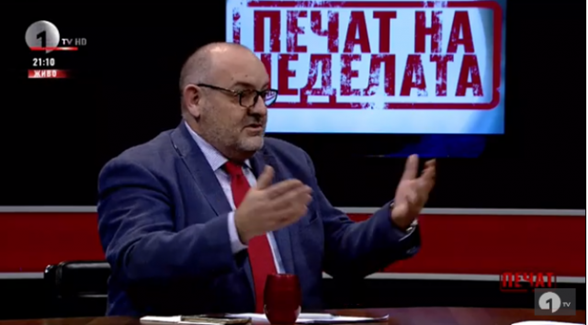
Sasho Ordanoski
As a journalist you received also threats. A car was set on fire in front of your house. Do you know who was responsible for this attack?
In the middle of the night on May 3-4, 2015, a car (owned by somebody else) parked in the parking lot at our family house in the village near Skopje was sat at blasé with an explosive device. Thanks to the fast reaction of the fire brigade both our and neighbour’s houses were saved from fire. That was a culmination of various forms of threats and intimidations perpetrated by the regime of Mr. Gruevski not only against me, but against a number of journalists and other critics of his government. Some people were physically attacked, others’ properties were set on fire or damaged, government’s powerful propaganda apparatus was inventing daily compromats and various forms of bullying targeting the “enemies” of Gruevski… Soon after the car-fire I was advised by some foreign friends to leave the country for some time, which I did for several months in the second half of 2015.
I never stopped writing my weekly and daily columns. They never stopped with a decade-long stream of intimidations. Gruevski was out of power in mid-2016, after an unsuccessful, violent coup d’etat attempt against the government of Zoran Zaev in Macedonian Parliament. Gruevski mysteriously left the country to Budapest in 2018 faced with a jail sentences at home.
And the investigation of the car-fire is still ongoing, without any results, as most of the other attacks against journalists in Macedonia during the Gruevski regime.
You have been also active in activities that are not connected to journalism. Can you tell us please a little more about this side of your life?
Well, my Ph.D. is in the area of sociology and communication that allows me to lecture several subjects at the two best private universities in the country for the last 15-20 years… I am also one of the founders of Transparency Macedonia back in 2001 and member of several prominent NGOs’ and think tanks’ networks in the region. Hundreds of conferences, seminars, initiatives, collaborations and platforms that tried to promote and support democracy around the Balkan. We were trying to change the world, before the era of “spread sheets” and excel tables were “invented” by the EU in the NGO sphere.
During the last three decades I’ve met wonderful people, many of them still good friends, some of them made important political and social careers in their respective countries.
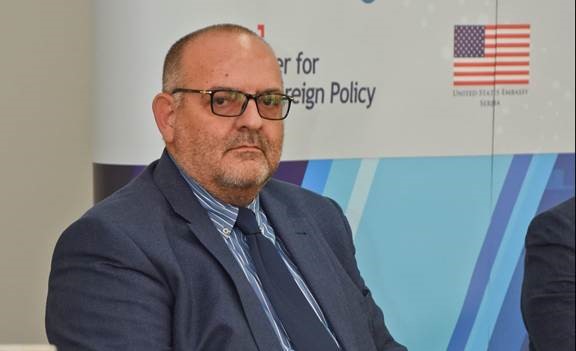
Sasho Ordanoski
Many experts are saying, that till end of 80´s, journalists working in news agencies in some leading positions and in foreign desks in media, where often connected to intelligent services. This part of history would be very interesting for younger journalists. This problem is not only connected to former Yugoslavia or to the “East Europe”, as according to researches we have many examples from journalists working also in the “West” for intelligent services. How strong was the influence of intelligent services on media some 30-40 years ago? Is it true that it was important in all “Communist countries” to be a member of the party or to work for intelligent service, for having a leading position in a media? Or was it different in “East Europe” and in the former Yugoslavia?
In undemocratic societies control over processes is done through control of people. Intelligence services and secret police are/were powerful tools for controlling people for the sake of the one-party systems or “democratic” autocrats. The rest is history and it would be too long to tell here.
However, in democratic societies those services are (or, better, should be) controlled by civilian democratic institutions, so the social processes can develop in the public arena through the competition of ideas, amplified by the influence of freedom of speech and mass media.
It is all about the power and how it is obtained, kept, distributed, used – or lost.
But, forget “East”, “West”, “former” and “ex”. What do we do now? It is the same world of broken mirrors that intelligence (and not-so-intelligent) services are trying to use and misuse everywhere in order to manipulate public opinion. That’s the oldest, never ending game in town.
Did politicians try to influence your work? If yes, how you reacted? Do you have some examples?
Of course that they try, every day, influencing is the core of their job. And I am “working my sources” every day, many of them are, namely, politicians. In media theory those grades of influence are called “political parallelism”, it is part of the “hundred shades of grаy” in which journalism normally operates. But, politicians are rarely misusing their positions and power by direct threats or bribes to journalists… Usually “the dirty work” is done by other players in the political realm, often through the owners of the media.
Eventually, everything comes down to the issue of the integrity of editors/journalists and their preparedness to bend the rules and standards in the profession. It is not a simple world out there, it requires some flexibility, but rules and standards DO exist.
What was your biggest challenge in your work?
Vanity. It is necessary, but a dangerous partner in journalistic profession, where things are too often personal. With years I learned how to control it much better. I would like to think that today I am successfully adjusting that “horse” under my knees.
Corruption is very present in the SEEMO region. Are also journalists corrupted?
Seriously?! There are no developed and stable (if any!) media markets in the SEEMO region that would secure sustainable institutional and professional existence of a large majority of existing media outlets. Most of the journalists are working for indecent salaries, many are paid in cash, and their jobs are insecure and in short demand… Proliferation of “informative” portals and shady internet propagandistic operations are spreading as wild fires… And so on and so forth… Why should there be corruption among the journalists in SEEMO region?!
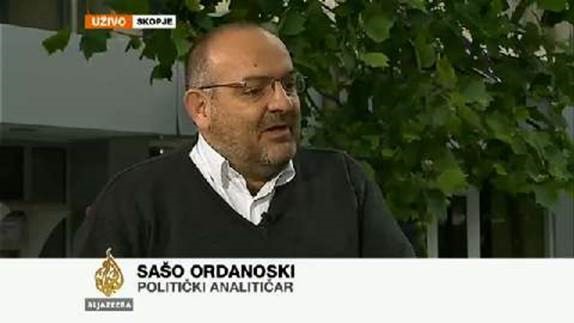
Sasho Ordanoski
You met also many important persons. Maybe if you can present some of them.
Look, for the profession of journalism it is not only important how good you or your media is, but also what kind of “history” is developing around you… Unfortunately, the SEE region has “produced” enough important, tragic and turbulent “history” in the last few decades, so many journalists had enough professional opportunities to cover events and people that, otherwise, in “normal” circumstances, they would have not been able to meet or report on. For instance, I got a chance to make an interview with an American president (Clinton) not because I was extraordinarily better than the competition, but because at some point the US-administration wanted to say something on Macedonia and the region – if it was not me on the journalistic side, it would have been somebody else doing the interview with the president.
So, yes, there were dozens and dozens of important people that I have met or interviewed in my 30+ years of journalistic career, but many more “ordinary” people were telling their powerful stories through my reports and articles.
However, let me tell you one story… At the end of the nineties, I was working as an unit production manager for six months for DreamWork’s production of a movie that involved the famous producer and several times Oscar winner Branko Lustig, on one side, and then the rising movie superstar George Clooney, as one of the main actors (partnered by Nicole Kidman), on the other side – and, as it usually happens in an A class Hollywood projects with high production stakes and even higher budgets, they had very turbulent mutual relations… For several weeks of shooting, many of their working “quarrels” were going “through” me: Lustig would shout to me what needed to be conveyed to Clooney, and Clooney would replay with the same sarcastic vigour what needed to be conveyed to Lusting, on few meters of distance between them, with me in the middle! Unforgettable! And very stressful… No pictures or videos on any of those “shouting matches” exist… Just sweet memories.
How hard it was to stay always professional?
Very hard. Almost impossible. But that constant strife is the beauty of this job. One piece at a time. Real journalism is a hard labour, long hours of work and personal sacrifice. It may look glamorous, but it is rarely that.
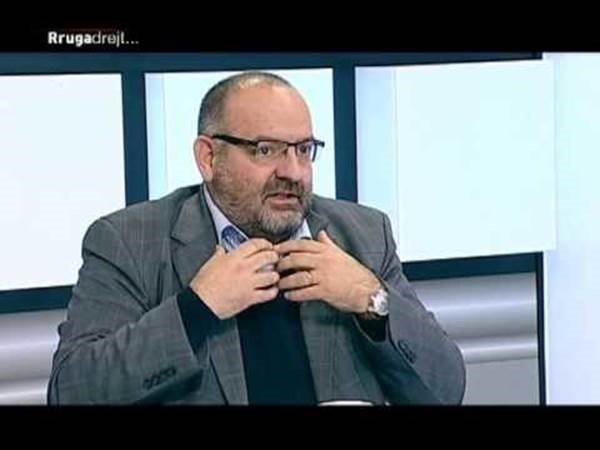
Sasho Ordanoski
Your work is connected to the South East Europe Media Organisation (SEEMO). You helped SEEMO also to organise a conference in Skopje some years ago. How important is SEEMO for you?
Networking is in the heart of our profession. We share many similar problems and challenges in the Balkan media, so exchanging experiences, ideas, and best practices with the regional colleagues is an important drill and, sometimes, therapeutic exercise. In good and, especially, in bad times.
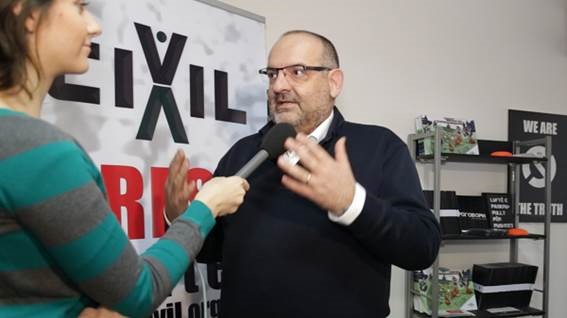
Sasho Ordanoski
Please walk us through a typical workday. How do you manage your time today?
My working day starts ten minutes before 6 o’clock in the morning, because at 7 a.m. I am in the TV studio for the “Morning Briefing” on slobodna.tv and slobodenpecat.mk that is on air every day 7:30-10:00. It is followed by the editorial meeting of 30 minutes to set the agenda for the next day, followed by a stream of coffee talks, phone conversations, business meetings and endless stream of messages on all platforms… Lunch with friends or family is a reserved daily slot around 3 p.m. even under “distancing” corona-conditions… Afternoons are dedicated for preparations for my university activities, readings/viewings of various contents, and other journalist or foreign consultant projects I run more often than I should.
My wife and kids are fulfilling my late afternoons and social evening events. I write my daily columns (“Good Morning with Ordanoski” for civilmedia.mk) every evening around midnight (after I digest most of the evening content of the local media and during listening to “The World Tonight” on BBC Radio 4), usually ending around 1 a.m. Weekends are reserved for “detoxification” and family activities, shopping extravaganzas (we have an army to feed!), travels and longer sleep in the morning…
Hmmmm… Not a half of this would be possible without a fabulous team of people I am surrounded at work, a selection of good friends that help whenever necessary with most ordinary life hitches, and a family that emanates love to me in bigger quantities than I sometimes deserve.
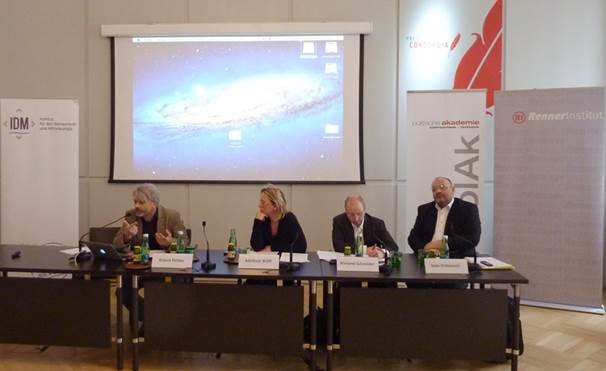
Robert Pichler, Adelheid Wölfl, Wieland Schneider, Sašo Ordanoski [© IDM]- round table by Institut für den Donauraum und Mitteleuropa – IDM In cooperation with Karl Renner Institute, Vienna and Politischen Akademie der ÖVP,Vienna
How do you see the media situation in you your country today?
In one word: good. In more details: not good. It is certainly much better than five years ago, but much бетер (i.e. worse) than where it should be.
For years the former prime minister Nikola Gruevski had a strong influence on the media situation in your country. How it happened that one person had so strong power and so strong influence?
It is called autocracy: it starts with silk gloves, with a lot of promising populism and misuse of public resources, until it is too late to stop it through normal democratic means. Gruevski knew that his propaganda machinery, together with the secret police apparatus, were of key importance for winning elections and eliminating political enemies. And he spent millions of euros on loyal media outlets and their editors and media “assassins”. It is not that complicated, really. Once one decides that staying in power is more important than democracy, the rest is technology of autocratic governing. Until the day comes when that technology cannot help you anymore.
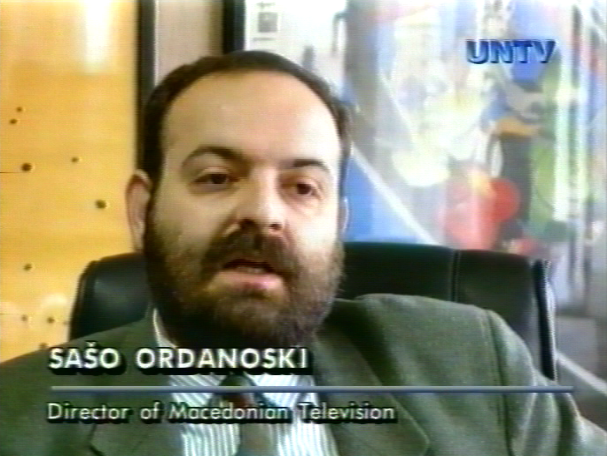
Sasho Ordanoski
Is it possible to protect from a new “Gruevski”? The question is also connected to the fact that we have similar politicians like Gruevski today in power in some other countries in the SEEMO region.
Yes, it is possible, if an independent democratic state and public institutions do their job. If not…
You are very often in Vienna. How important is this city for you?
Vienna is the biggest and the most dynamic centre for Western European interests in the Balkans, with many experts who understand the Balkan mentality and geopolitical, often historic complexities. Not to mention its urban beautifulness, hospitality of local people and proximity to regional capitals. To have Vienna in your “neighbourhood” is a privilege that should not be missed!
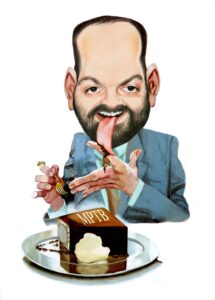
Finally, as press freedom and democracy is very important in your life, can you give please some advice for younger journalists?
Freedom and democracy are never solved once and for all! Rarely they are lost in one night, but if you allow many days somebody else, and not you, to fight for freedom and democracy, the night will come when there will be no one else to fight for YOUR freedom and democratic rights. As journalist, we are at the front lines of this constant struggle, like it or not.
